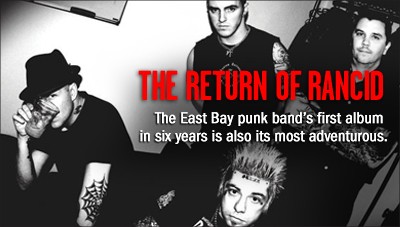Although its members experienced the sort of blue-collar, counterculture-obsessed, music- and drug-fueled youth that has led many a disillusioned teenager into the arms of the punk lifestyle, Rancid has never been a straight punk band. Its roots lie in two-tone ska as surely as they do 1970s British punk, and the group is a direct descendent of ska-punk pioneer Operation Ivy, which formed in 1987 and folded two years later under the pressure of major-label interest. From that pedigree, Rancid coalesced in Albany in 1991, and eighteen years later the East Bay export is uniquely positioned as a paragon of 21st-century American punk rock.
Compared to its compatriots Green Day and the Offspring, who helped launch the mid-Nineties punk revival, Rancid has been the most successful at maintaining a steady career while retaining its punk credentials. It’s not an easy task. Both Green Day and the Offspring migrated to major labels, where the former eventually wrote a bombastic rock opera and the latter dashed any chance at aging gracefully with pop-punk novelty “Pretty Fly (for a White Guy).” Despite a brief (and much critiqued) dalliance with Warner Bros. Records in 2003, Rancid has fought to embody the punk ethic while continuing to call upon its humble beginnings.
Despite all this, the quartet has sounded less like a true punk band and more like a hybrid with every new release (the exception being 2000’s Rancid, but more on that later.) Its latest, Let the Dominoes Fall, out this week on Epitaph Records, is bolder than anything Rancid has produced to date, featuring two acoustic tracks, a stable of new instruments such as steel guitar and harmonica, and soul legend Booker T. on Hammond B-3 organ. After a six-year break, including time for multiple side projects (guitarist Lars Frederiksen’s band, bassist Matt Freeman’s stint with Social Distortion, and frontman Tim Armstrong’s Transplants trio), plus the departure of founding drummer Brett Reed, will longtime fans have the patience for such a sprawling comeback? The answer lies no further than Rancid’s gauntlet of a discography, which has already served as a proving ground for band and followers alike.
Back in 1993, Rancid’s self-titled debut was a fast, furious, and unapologetic punk rock record. It featured hardly a trace of Operation Ivy’s ska, but the use of both congas and maracas hinted at an eclectic sensibility. The album’s final song gave the clearest indication of what was to come: “Get Out of My Way” is simply a gruffer, speedier version of a ska song written by fellow Berkeley band the Uptones. Even if fans glossed over it, Rancid was already sowing the seeds of a more open-minded future.
That future began to reveal itself on 1994’s Let’s Go, and particularly 1995’s …And Out Come the Wolves, where Rancid established itself as a leader in the mid-Nineties punk wave through skillful appropriation of the Clash’s streetwise, political punk rock and the Specials’ upbeat, beguiling two-tone ska. Another shot at major label fame came and went, and the band responded by inviting an even broader array of influences into its palette: 1998’s Life Won’t Wait experimented unapologetically with reggae, blues, and plenty more ska. This was a turning point for the band’s fans as much as for the band itself, a way to separate the wheat from the chaff and solidify a flexible yet devoted base.
Flexibility would prove key with the band’s next release: 2000’s Rancid was a scorching hardcore punk album that tore through 22 songs in 38 minutes without a hint of ska, reggae, or roots. Whether it was an olive branch to early fans or a release valve for pent-up aggression, the end result was the same: Rancid proved the mohawks, tattoos, and spikes it still sported were more than a fashion statement. But three years later the band was back to its wandering ways: 2003’s Indestructible, the album that sparked the Warner Bros. fallout, was stylistically closest to …And Out Come the Wolves with its blend of punk and ska. Thrown into the mix for the first time was a slow ballad that presaged the slower paces of “Civilian Ways” and “The Highway” on the new record.
For all its diversity, Let the Dominoes Fall begins predictably. Six of the first eight tracks — including hometown rallying “East Bay Night,” hater-baiting “Last One to Die,” and “Ruby Soho”-copping “Disconnected” — are straight-up punk; the other two are ska-flavored. From there, the album opens up: hard rock, country, surf rock, ska, and dub weave in and out of Rancid’s trademark sound, a feat abetted by longtime producer Brett Gurewitz. Most of the songs still clock in under three minutes, and nearly half address social or political issues.
All of which is to say: Let the Dominoes Fall is a punk album in spirit as much as in sound, and with Green Day enjoying international rock-star status, Rancid has become the quintessential popular punk band of 2009. The band’s road has been rocky, but it’s always returned to the same place — and that makes all the difference. Perhaps acknowledging a still uncertain future, Armstrong closes the new album on a personal note: I just wanna play one more show and make some music with my friends, he sings sincerely. Even if that’s not enough, it’s got to be worth something.
















